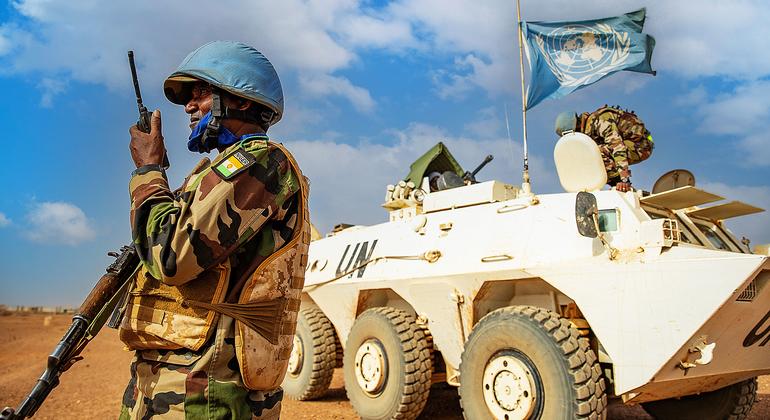Security Council members reiterated strong support for the full withdrawal of the decade-old UN Multidimensional Integrated Stabilization Mission in Mali (MINUSMA), and the transfer of security responsibilities to the country’s transitional Government, which has been in power since a coup in 2021.
Commending the peacekeeping operation and its staff, UN Secretary-General António Guterres called for the “full cooperation of the transitional Government for an orderly and safe withdrawal of the mission’s personnel and assets in the coming months”, said Farhan Haq, his deputy spokesperson.
The UN chief also urged all the signatory parties to the 2015 Agreement on Peace and Reconciliation in Mali “to continue honouring the ceasefire as MINUSMA withdraws”, Mr. Haq said.
However, the UN chief remains concerned by the fact that the level and duration of the financial commitment authority required to facilitate the drawdown process have been significantly reduced during budget negotiations in the General Assembly’s Fifth Committee, the deputy spokesperson said, adding that “this increases the complexities and risks of the drawdown operation”.
Meanwhile, the Secretary-General will continue to engage with the transitional Government on how best to serve the interests of the people of Mali in cooperation with the UN Country Team in Mali, the UN Office for West Africa and the Sahel (UNOWAS) and other partners.
Security Council’s unanimous support
By the terms of the adopted resolution, MINUSMA will begin drawing down its presence on Saturday and will completely withdraw from Mali by 1 January 2024.
The Council also authorized the mission to respond with force to imminent threats of violence to civilians and contribute to the safe civilian-led delivery of humanitarian assistance, up to 30 September.
Established by the Council in 2013 following a coup the previous year, the mission’s presence, as of February 2023, stands at more than 15,000 personnel, according to MINUSMA.
Media reports have depicted a grim security landscape. Over the past decade, Mali and the Sahel region have seen a surge in clashes and attacks by armed groups and terrorist affiliates, with 303 peacekeepers killed, according to MINUSMA.
Conditions have also worsened due to climate shocks, and rising intercommunal tensions over scarce resources that have become the main drivers of continued violence, mass displacement, instability, and cross-border trafficking.
UN mission’s ‘crucial role’
Echoing a common message from Council members, Ghana’s Ambassador Harold Adlai Agyeman said the resolution marks a milestone, adding that MINUSMA has played a “crucial role” in securing Mali amid many challenges.
Many Council members agreed that the mission’s drawdown does not end the international community’s assistance to Mali. Russia’s Deputy Ambassador Anna Evstigneeva said Moscow will continue to provide support, including on a bilateral basis.

A MINUSMA armoured vehicle in Aguelhock, Mali.
Security concerns
Several Council members, including the United Kingdom’s Ambassador Barbara Woodward, cautioned that the withdrawal is occurring at a time of fragility in the Sahel region.
Reflecting those concerns, Ambassador for the United States Jeffrey DeLaurentis said all efforts should be made to address such issues as the presence of armed actors, including the Wagner Group, a Russia-based private security contractor that media reports have indicated as being active in Mali.
“Although we regret the decision of the transitional Government to abandon MINUSMA and the fact that this will harm the Malian population, we voted in favour of the resolution since we are satisfied with the withdrawal plan adopted,” he said.
Mali: Government pledges full support
While MINUSMA did not achieve all of its goals, Mali’s Ambassador Issa Konfourou said the mission has made gains in such areas as human rights.
Ahead of the withdrawal, he said the Malian Government will ensure compliance with the terms of the mission’s disengagement within the established timeframe.
In addition, Mali will continue to work tirelessly to protect civilians over all its territory, he said, paying tribute to peacekeepers’ contributions.
However, he regretted that the Council continues to consider the current situation in Mali as a “threat to international security”, pointing to such gains made as a resumption of constitutional order and the advance of the Algiers Process towards achieving lasting peace.
For more details on this and other meetings occurring throughout the UN system, visit our dedicated UN Meetings Coverage page.



